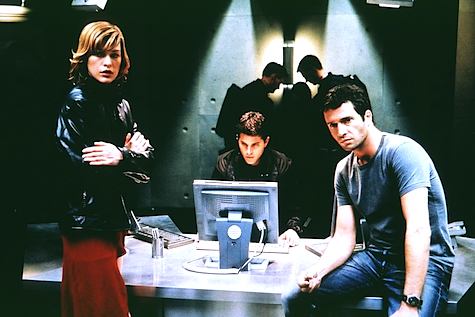The first Resident Evil film, released in 2002, grossed over $100 million worldwide. 2004’s Resident Evil: Apocalypse did even better than its predecessor, taking nearly $130 million. Columnist Roger Ebert proved equally critical of them both, calling Resident Evil a film in which, “large metallic objects make crashing noises just by being looked at,” (ChicagoSun-Times, March 15, 2002) and Resident Evil: Apocalypse, “an utterly meaningless waste of time. There was no reason to produce it, except to make money, and there is no reason to see it, except to spend money. It is a dead zone, a film without interest, wit, imagination or even entertaining violence and special effects.” (ChicagoSun-Times, September 10, 2004.)
All due respect to the honourable Mr. Ebert, but he’s rather too harsh on my favourite B-movie series. There’s a lot to be said for films that know they exist to be B-movie action/horror flicks, and then set out to be the best possible B-movies they can be. They know they have no real statement to make about the human condition, and they revel in it. Zombies! Monsters! Evil corporations and underground bases! Amnesia! Untrustworthy artificial intelligences! Plots!
…And that’s just the first film.
If you ask me to be serious and self-reflective when talking about Resident Evil, I’ll tell you the truth: there’s no point. If you’re here for logic, not for zombies and the monsters, this is the wrong franchise entirely. These are films—much as the first half-hour of Resident Evil tries to pretend otherwise—about improbably competent women kicking ass and taking names—and there aren’t a lot of living names left to take. Because if you hadn’t noticed? The Resident Evil films* pass the Bechdel test in an utterly off-hand fashion. And that’s what turns them from action films made of cheese into something I can love.
*I haven’t seen Retribution yet, so all my generalisations should be taken to exclude it.
There are only two characters that stand out with any compelling personality in Resident Evil, Alice (Milla Jovovich) and the female paramilitary, Rain (Michelle Rodriguez). The other characters come straight out of central casting, perhaps especially the undercover fake cop (Matt, played by Eric Mabius) who finagles his way onto the paramilitary team sent to investigate why the Umbrella Corporation’s underground genetics research facility, the Hive, has fallen out of touch with the rest of the world, and whose sister, a Hive employee, was supposed to pass him proof of Umbrella’s wrongdoing.
Alice is a cipher. From the moment we encounter her—after a cold open in which a NBC-suited hand steals vials of unknown substances from a lab, smashing one as it leaves, and what seems to be an ordinary workplace rapidly becomes a death-trap—naked, in a shower, suffering a possible head-injury, she’s as much a cipher to herself as she is to us. The lack of dialogue in the eerie, empty mansion until Matt comes through the door and the black-clad paramilitaries come through the windows reinforces the cipher-like nature of the main character: Alice is a woman upon whom we may inscribe whatever motives and history we wish, and her ridiculous red dress and obvious bewilderment urge us to make assumptions about a blond, reasonably well-muscled woman** whom we first see mostly naked.
**It’s a definite plus that Jovovich actually looks physically capable of, you know, holding her own in a fight. Whatever one might say about the ridiculous red dress.
Every cultural trope and cinema cliché tells us to see her as vulnerable. Without context, amnesiac, perhaps she even is—but this is where Resident Evil takes a few steps outside the B-movie clichés. Because of all the characters in this film, it’s Alice who—we discover as she does—is probably the toughest. Who, faced with dead scientists, can take a minute to silently make fun of the paramilitaries. Who goes after Matt when he splits from the group. Who, it’s gradually revealed, knew what Matt’s sister was after. Who isn’t sure, until quite late in the film, whether she caused the slaughter or tried to act to prevent it.
Who doesn’t give up, even when the paramilitaries start dropping like flies, first to the AI’s defences, and then, when the doors start opening, to the zombies. Even when the group of survivors is fleeing a madly mutated monster.
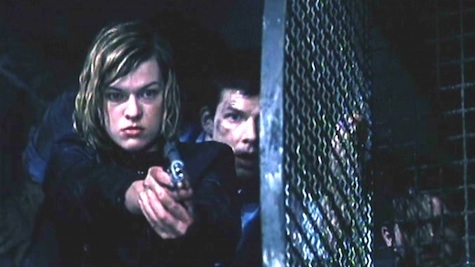
Even when, at the film’s close, she wakes alone in a laboratory, and walks outside to see a post-apocalyptic scene of abandoned vehicles and silence. The last image is of Alice, in her hospital gown, making ready a shotgun scavenged from an empty police car.
Laid against this arc of discovery, of rediscovery of agency, I personally don’t give much of a damn about the film’s flaws. Apart from Tomb Raider and Underworld, there are damn few action-adventure movies that put a female protagonist centre-stage—and Tomb Raider is far less smoothly done, while Underworld centres Selene’s emotional arcs around the men in her life.
Resident Evil: Apocalypse is less cleanly constructed: it’s a film with much less interiority, both emotional and literal. It’s all about running and fighting… and occasionally gallows-humour quipping.
Thanks to the Umbrella Corporation’s incompetence/greed, Raccoon City suffers an outbreak of the zombie plague. Sealed off from the outside world, doomed, a rag-tag band comes together to rescue an Umbrella scientist’s daughter in return for his help in their escape. This group includes Jill Valentine (Sienna Guillory, whom the costume dept. did not exactly dress well for zombie-fighting), a hard-as-nails and possibly crazy disgraced cop, non-disgraced cop Peyton (Razaaq Adoti), LJ Wayne, first met under arrest (Mike Epps), a TV reporter (Sandrine Holt), and Umbrella Corp paramilitary Carlos Olivera (Oded Fehr), as well as Alice—back, and ever more ready to kick ass, since Umbrella mucked about with her insides.
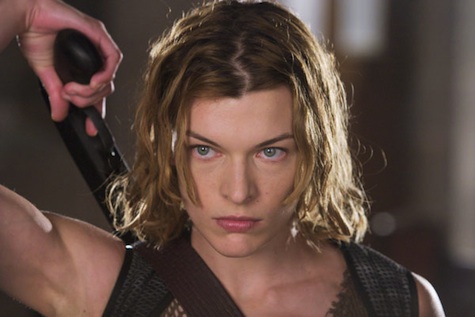
Alice: There won’t be any help. According to Ashford, Umbrella know they can’t contain the infection. So at sunrise this morning, Raccoon City will be completely sanitized.
Terri Morales: What do you mean by “sanitized”?
Alice: A precision tactical nuclear device.
Jill Valentine: What yield?
Alice: Five kilotons.
Valentine: Fuck me.
There’s a cheerful absence of logic in how Alice first meets up with Jill Valentine while mowing down a couple of zombie-monsters. But it’s important to enjoy the explosions and just roll with it: we’re here for the BOOM, and the fact that in all of this zombie-killing, monster-fighting mayhem, none of our heroes are white guys.
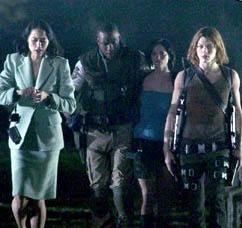
No, really. That gives me so much of a thrill.
The most badass people here are Alice and Jill Valentine. Alice powers through on strength of will, especially when it comes to facing the super-monster—Nemesis—Umbrella have decided to unleash on the doomed city. And it’s Alice who’s ultimately left behind when the survivors escape from the wreckage of the helicopter they use to flee the city—left for dead, to fall vulnerable into the hands of the Umbrella Corp.
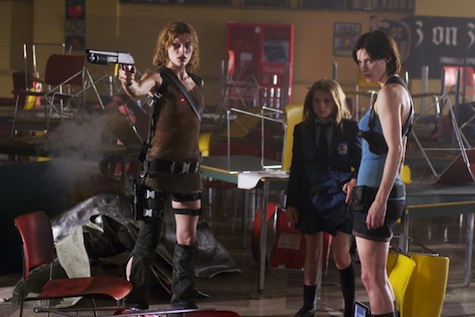
But once again her vulnerability is a misdirection. And the Umbrella Corp scientist who fails to realise this pays for his misapprehension.
Her name is Alice. And she remembers everything.
Liz Bourke can be relied upon to cheer for badass women shooting monsters. What can she say? It’s a thing. Find her @hawkwing_lb, where she’s been known to complain about their absence.










